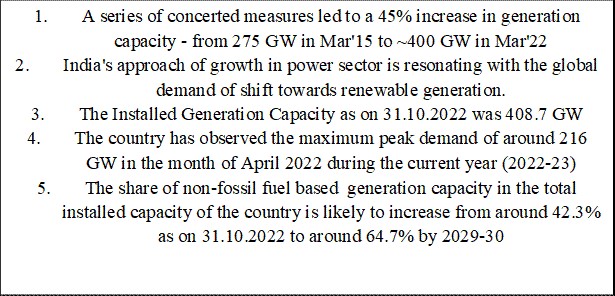Ministry of Power
Meeting of the Consultative Committee of the Members of Parliament for Ministry of Power held
Posted On:
22 DEC 2022 3:58PM by PIB Delhi

The Meeting of the Parliamentary Consultative Committee of the Members of Parliament for the Ministry of Power was held in New Delhi last evening. Shri R. K. Singh, Union Minister for Power and MNRE chaired the meeting. Minister of State for Power Shri Krishan Pal Gurjar was also present. Members of Parliament of various political parties took part in the meeting. The MPs present were Shri Ritesh Pandey, Lok Sabha, Smt. Riti Pathak, Lok Sabha, Shri Chandra Sekhar Sahu, Lok Sabha, Shri Khagen Murmu, Lok Sabha, Shri Pradyut Bordoloi, Lok Sabha, Shri Ravi Kishan, Lok Sabha, Shri Tapon Kumar Gogoi, Rajya Sabha and Dr. Amee Yajnik, Rajya Sabha.
The subject of the meeting was "Capacity Addition to meet Projected Demand for the year 2030". Shri Ghanshyam Prasad, Chairman CEA gave a presentation on the subject.
During the meeting, Shri R.K Singh informed that we have provided 2.90 crore connections which has increased consumption resulting in increased demand for power. This also shows that India's economy is growing. He remarked that we had achieved our NDC commitments of 40% non-fossil fuel generation made in COP26 way before the committed deadline, that is, 9 years ahead of target date. Today, the generation from non-fossil fuel stands at 42%, the Minister said. He further added that we have now made a commitment of non-fossil fuel generation of 50% by 2030 which we shall achieve.
In the wake of Energy transition towards clean energy, the future Indian power sector is being developed on the pillars of resilience and reliability towards ensuring energy security and adequacy for meeting the growing energy demand of the country. India is committed towards reducing its carbon footprint in line with the global response to tackle challenge of climate change. India's approach of growth in power sector is resonating with the global demand of shift towards renewable generation. In this regard, India stands committed to reduce Emissions Intensity of its GDP by 45 percent by 2030, from 2005 level and achieve about 50 percent cumulative electric power installed capacity from non-fossil fuel-based energy resources by 2030.
The Indian power sector has come a long way in the past decade, transforming from a power- deficit to a power-surplus nation. A series of concerted measures led to a 45% increase in generation capacity - from 275 GW in Mar'15 to ~400 GW in Mar'22. Electricity generation also increased in tandem at a CAGR of ~4%, enabling India to reduce its energy and peak deficit from 4.2% and 4.5% in 2014 to 0.4% and ~1% in 2022 respectively. The Installed Generation Capacity as on 31.10.2022 was 408.7 GW comprising of 235.9 GW thermal, 6.8 GW Nuclear, 165.9 Renewables including large hydro of 46.8 GW.
The country has observed the maximum peak demand of around 216 GW in the month of April 2022 during the current year (2022-23). The Peak demand has grown at a CAGR of 4.6 % during 2014-15 to 2021-22 while Energy Requirement has grown at a rate of 3.71% during 2014-15 to 2021-22.
Energy storage systems can prove useful in combating the challenges posed by integrating intermittent generation sources into the grid and the grid stability issues due to large fluctuations in demand, to ensure quality of supply on real time basis by storing excess generation over different time horizons (minutes, days, weeks). The share of non-fossil fuel based generation capacity in the total installed capacity of the country is likely to increase from around 42.3% as on 31.10.2022 to around 64.7% by 2029-30. The share of fossil fuel based capacity in the total installed capacity of the country as on 31.10.2022 is 57.7%, which is likely to reduce to 35.3 % by 2029-30. The projection of total capacity addition is in line with the target of the country to achieve 50% of non-fossil based installed capacity by the year 2029-30.
India is on its path of Energy Transition ahead of other countries and will meet its revised NDC commitment of 50% installed generation from non fossil fuels. For Energy Security and reliability of supply, coal based capacity of 47 GW is to be added. Transmission plan for integration of 537 GW of RE in the grid is in place. The RPO trajectory has been notified till 2030. The Electricity (Amendment) Bill 2022 has provision for enforcement of RPO. The state wise detail plan is being prepared. The Green Energy Open Access Portal has been operationalized. The development of Hydro and Hydro Pumped storage is on fast track. The guidelines on Hydro pumped storage is under finalization and the hydro policy is being revised. An Energy Storage system (BESS and Hydro PSP) is needed for RE integration. All stakeholders must join together to achieve the targeted generation capacity addition to ensure supply of reliable 24x7 quality power to all the consumers.
Members of Parliament made several suggestions with regard to various initiatives and schemes. The members praised the initiatives of the government in achieving NDC targets. They further discussed in the meeting issues regarding status of DISCOMs, grid security and hydro power generation. Shri Singh closed the meeting thanking the participants for their valuable suggestions.
***
NB/IG
(Release ID: 1885746)
Visitor Counter : 1714
Read this release in:
Urdu